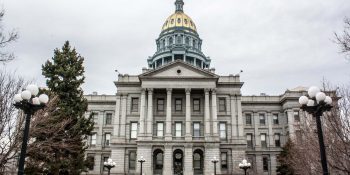COLORADO – Today, Colorado U.S. Senator Michael Bennet and U.S. Representatives Diana DeGette (C0-1), Ed Perlmutter (CO-7), Jason Crow (CO-6), and Joe Neguse (CO-2) urged the U.S. Department of Agriculture (USDA) to consider the detrimental effects of their proposed rule to alter broad based categorical eligibility (BBCE), which would take food assistance away from 33,000 Coloradans, including 11,000 children and 7,300 seniors, who participate in the Supplemental Nutrition Assistance Program (SNAP).
In July, USDA proposed a regulation to drastically alter broad based categorical eligibility in SNAP, despite Congress rejecting such changes to SNAP rules on a bipartisan basis in the 2018 Farm Bill. In a letter to Secretary of Agriculture Sonny Perdue, the lawmakers expressed serious concerns about the proposed rule, which will take away SNAP from 17,872 Colorado households.
“As members of Congress, we are dedicated to ensuring an effective nutrition assistance program for Colorado and for the nation,” wrote the lawmakers in the letter. “Colorado has expanded SNAP eligibility using BBCE, helping many families save for essential household expenses such as the purchase of a reliable vehicle, the deposit for a new apartment, or to deal with a family emergency. Colorado now serves more than 460,000 individuals annually through the SNAP program many of whom would suffer under the Administration’s proposed changes to BBCE.”
The lawmakers also cited the economic benefits that SNAP generates in Colorado. The Colorado Department of Human Services (CDHS) found that each federal dollar spent on SNAP generates as much as $1.70 in economic activity, leading the agency to estimate that the state stands to lose more than $20 million in economic activity due to the proposed rule.
Above all, the lawmakers emphasized the effect of the proposed rule on children across Colorado.
“…children who qualify for SNAP automatically qualify for the free school meal program,” wrote the lawmakers. “The rule would break that linkage, increase red tape for kids and families, and shrink program participation – to the detriment of Colorado students.”
“We urge the Department to consider the detrimental effect this proposed rule would have on our constituents,” the lawmakers concluded.
The text of the letter can be found HERE and below.
Dear Secretary Perdue:
We write with serious concerns regarding the Department of Agriculture’s recent proposed rule “Revision of Categorical Eligibility in the Supplemental Nutrition Assistance Program (SNAP) (84 FR 35570)”. The proposed rule will take away SNAP from an estimated 3.1 million people nationwide. Vulnerable SNAP participants in Colorado, including senior citizens and children, will face increased hunger and insecurity.
SNAP is essential for the 430,150 households across Colorado that do not earn enough income to meet their basic needs-the vast majority (88 percent) of which have at least one worker in the house. Nearly one in eleven (9.2%) Coloradans struggle to put food on the table, including many adults in the workforce who may be struggling due to a job loss, lack of available full-time hours, or low pay.
Broad Based Categorical Eligibility (BBCE) is a policy that provides states the option to adjust the income cutoffs in SNAP so working families – whose incomes are often volatile – don’t abruptly lose support when they earn slightly more money. Over 40 states use BBCE to help families build savings to carry them through emergencies and build a bridge out of poverty to self-sufficiency, while reducing the administrative burden for individuals and state agencies. Colorado has expanded SNAP eligibility using BBCE, helping many families save for essential household expenses such as the purchase of a reliable vehicle, the deposit for a new apartment, or to deal with a family emergency. Colorado now serves more than 460,000 individuals annually through the SNAP program many of whom would suffer under the Administration’s proposed changes to BBCE.
According to the Colorado Department of Human Services (CDHS), the proposed rule would take away benefits from 33,000 Coloradans, including 11,000 children and 7,300 seniors. Multiple studies show that SNAP has a positive effect on poverty reduction, nutrition, and health, particularly for the children and older Americans who will be most severely affected by the changes.
Research suggests that each dollar spent by the federal government on SNAP benefits generates as much as $1.70 in overall economic activity. The average benefit amount for the 17,872 Colorado households who would be kicked off due to the BBCE rule change is about $58 per month. Therefore, CDHS estimates that the state stands to lose more than $20 million in economic activity
Students are yet another population impacted by this ruling; children who qualify for SNAP automatically qualify for the free school meal program. The rule would break that linkage, increase red tape for kids and families, and shrink program participation – to the detriment of Colorado students.
Lastly, states will also suffer increased administrative costs and processing hurdles. The Trump Administration’s own calculations estimate the proposed rule would result in an increase of 4.3 million annual processing hours for State Agencies across the country at a total cost of $92.5 million.
Not only does the Administration’s proposal strip nutrition assistance from the most vulnerable and increase costs for states, it clearly ignores the longstanding congressional intent of the program. SNAP categorical eligibility was first authorized in the Personal Responsibility and Work Opportunity Reconciliation Act of 1996. Congress has re-authorized it multiple times since then, most recently in the bipartisan 2018 Farm Bill. Congress considered changes to BBCE during the 2014 and 2018 Farm Bills, and in both cases explicitly rejected changes to BBCE on a bipartisan basis in the final bills. For example, the House-drafted 2018 Farm Bill would have limited SNAP categorical eligibility, yet the final 2018 Farm Bill Conference Report, which was approved by 369 members of the House and 87 members of the Senate, deleted the House provision, rejecting changes to BBCE.
As members of Congress, we are dedicated to ensuring an effective nutrition assistance program for Colorado and for the nation. We urge the Department to consider the detrimental effect this proposed rule would have on our constituents.
Sincerely,
SPREAD THE NEWS
COMMENT, Like, Follow & SHARE @I70Scout









